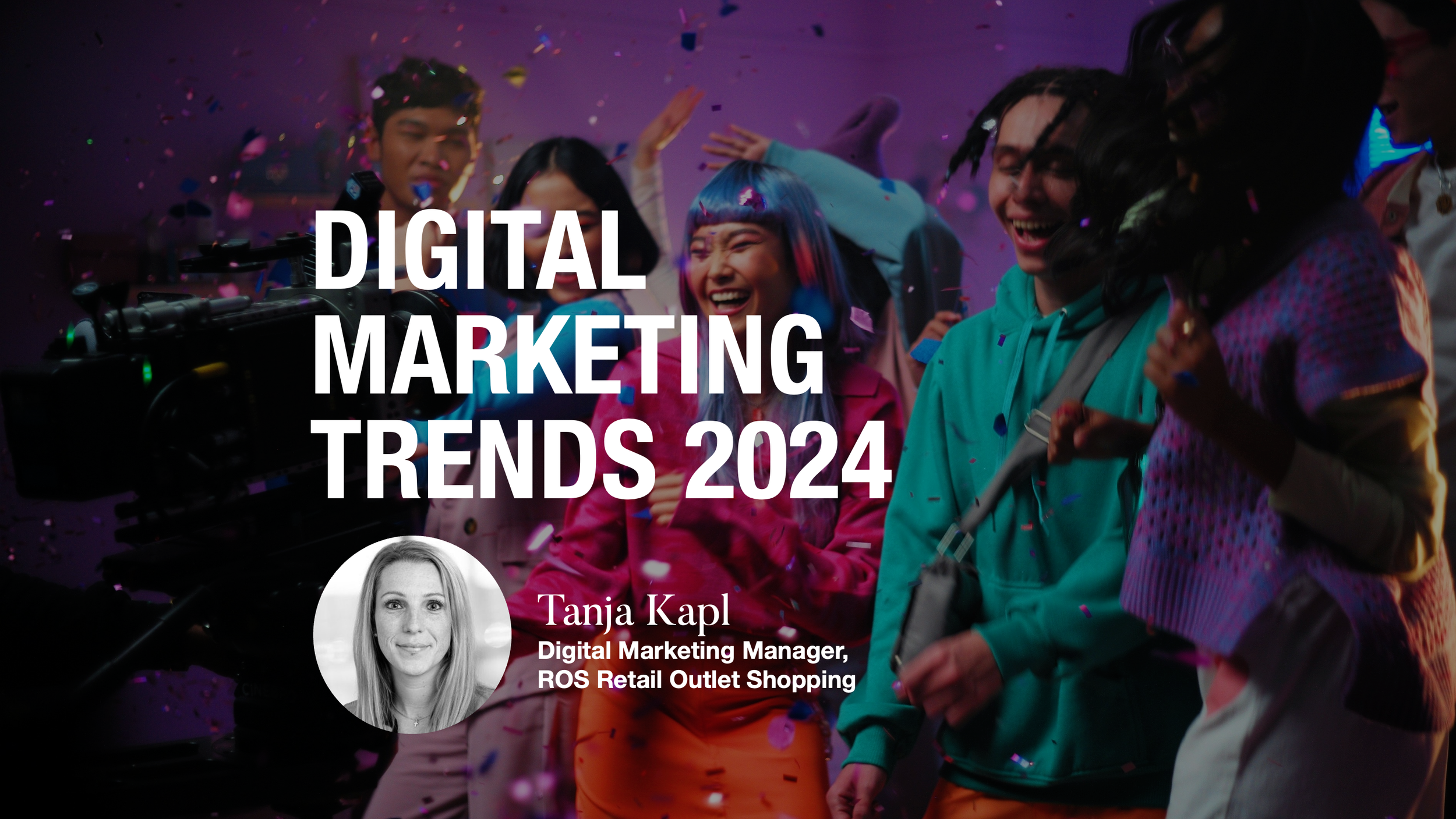Digital Marketing Trends in 2024
2024 is emerging as a year in which brands will connect with their audiences in newly redefined ways. Staying ahead of the curve will allow for the formulation of effective strategies to drive business development and enhance brand value, which is imperative to remain relevant and competitive in today's ever-changing marketplace.
In line with current trends, Designer Outlets are adapting to the importance of digital media to attract, excite, convince and retain customers. Following an omni-channel approach, ROS aims to convert internet users into buyers and build customer loyalty.
Digital Marketing Manager Tanja Kapl, who is responsible for the digital strategy and its implementation across the ROS portfolio, speaks about the digital trends that will shape the year 2024.
The digital marketing landscape is evolving at a rapid pace. What are the main drivers of this transformation?
There are several factors driving the rapid evolution in digital marketing. One of them is undoubtedly the large number of new apps that are emerging, along with the thirst of new generations to follow new trends. In addition, we live in a faster-paced world, which also means that a response to a message is expected in a matter of seconds compared to earlier times when you would call someone who was not at home and not be able to reach that person for hours.
There are today many social media platforms, but not all of them may be a good fit for a business. Which ones do you think hold the most potential in fashion & lifestyle?
For fashion, home and lifestyle it would definitely be Instagram. It is a channel in constant growth and still holds a lot of potential, also for beauty and everything related to physical appearance and aesthetics.
With so much information overload and shortened attention spans, capturing consumers’ attention online isn’t getting any easier. Does this mean that we should still focus on short-form videos?
Yes, that’s the way to go! But not any short-form video would do, it needs to be attractive from the very first moment and have catchy music. All so that it immediately catches your eye while scrolling.
Modern consumers are showing signs of fatigue towards traditional influencer marketing. According to the latest BoF-McKinsey survey, more than 40% of consumers prefer influencers who are relatable and authentic. Does this mark a paradigm shift to a new wave of creators who will change how brands connect with their audiences?
I would say that authenticity and niche relevance are winning out over follower count. Not only that, but content needs to be increasingly catchy and relatable. This is where the new content creators are displacing traditional influencers, as the interactions are perceived as more genuine, and they know exactly how to capture the attention of users.
Aware of this, ROS is trying to find the right balance in the social media content across our portfolio. We don't just work with a single influencer nor do we focus solely on influencers and content creators with a large community, but we try to find a middle ground that suits our audience.
Last year, we saw a prime example of the rise of artificial intelligence (AI), which will continue in 2024. What is your opinion on it when it comes to digital marketing?
It is true that artificial intelligence is gaining ground. In the field of image and text generation, it is unbeatable. Content can be improved with various tools, or even new images and texts can be created. Sometimes even better than naturally created content.
Still, it is necessary to have a human being check the created materials, as they are not 100% reliable. I am glad that it is not yet possible to fully replace humans.
Hyper-personalization is another key player this year. Today’s consumers are increasingly seeking experiences that are specifically tailored to their preferences. Why do you think this is and what can we expect in digital marketing?
Personalized marketing is something we have been doing for years in the digital marketing sector. Paid and targeted advertising on social media is anchored in every digital marketeer’s DNA.
In a world where consumers are saturated with content (almost every company or brand uses social media ads, sends out newsletters, etc.), it is not surprising that consumers try to block content that does not suit their needs from being overspammed and overwhelmed.
Among the most significant trends in this area are loyalty programs, tailor-made offers as well as newsletters dedicated to shopping behaviour, among others. In the centres managed by ROS, we are trying to follow these trends.
Data is king, especially for effective marketing strategies, and with it comes privacy, which has taken centre stage over the last years due to the EU’s GDPR. How far have we come and what is at stake here?
Data protection is a very personal matter. There are people who have no issue whatsoever disclosing everything and, on the contrary, others who would prefer to remain completely anonymous. Both views should be respected. Today's most common tools and systems offer us the opportunity to accommodate this difference, respect the wishes of our customers and still have data we can work with as much as possible.
We do not need to know the preferences of a single person. We can anonymise the person and still get to know the personality of our customers.
As said, the systems offer a variety of solutions to still know the market, but not a single customer.
Any last recommendation you have for digital marketeers?
Don't stick too much to commonly used tools – trends or the market itself can change quickly. 😉


